-
 Bitcoin
Bitcoin $114400
1.32% -
 Ethereum
Ethereum $3499
2.20% -
 XRP
XRP $2.922
4.26% -
 Tether USDt
Tether USDt $0.0000
0.03% -
 BNB
BNB $752.6
1.53% -
 Solana
Solana $161.8
1.64% -
 USDC
USDC $0.9999
0.01% -
 TRON
TRON $0.3267
1.32% -
 Dogecoin
Dogecoin $0.1991
3.02% -
 Cardano
Cardano $0.7251
3.29% -
 Hyperliquid
Hyperliquid $38.32
3.36% -
 Stellar
Stellar $0.3972
7.58% -
 Sui
Sui $3.437
2.74% -
 Chainlink
Chainlink $16.29
3.65% -
 Bitcoin Cash
Bitcoin Cash $545.3
3.70% -
 Hedera
Hedera $0.2482
7.49% -
 Ethena USDe
Ethena USDe $1.001
0.03% -
 Avalanche
Avalanche $21.40
2.02% -
 Toncoin
Toncoin $3.579
1.56% -
 Litecoin
Litecoin $109.3
2.20% -
 UNUS SED LEO
UNUS SED LEO $8.951
-0.18% -
 Shiba Inu
Shiba Inu $0.00001220
2.75% -
 Polkadot
Polkadot $3.613
2.99% -
 Uniswap
Uniswap $9.173
3.78% -
 Monero
Monero $302.6
2.62% -
 Dai
Dai $0.0000
0.00% -
 Bitget Token
Bitget Token $4.320
1.52% -
 Pepe
Pepe $0.00001048
3.40% -
 Cronos
Cronos $0.1314
4.33% -
 Aave
Aave $259.4
3.54%
How to calculate Bitcoin transaction fees? Factors affecting Bitcoin fees
Bitcoin transaction fees vary based on network demand, transaction size, and chosen fee rate, impacting confirmation speed.
Jun 17, 2025 at 09:00 am
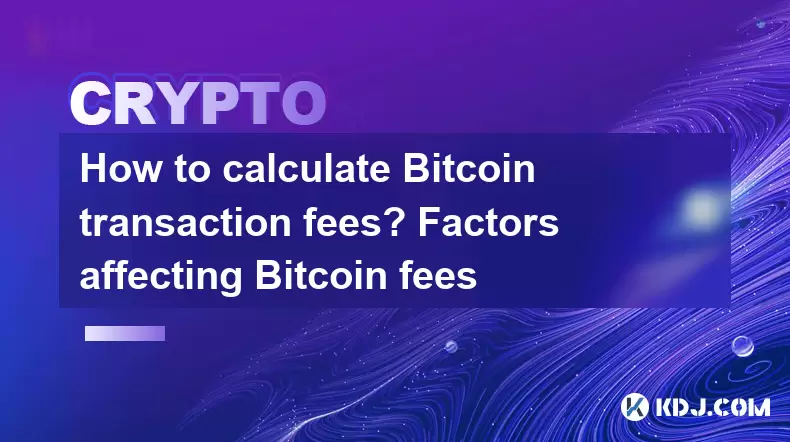
Understanding Bitcoin Transaction Fees
Bitcoin transaction fees are an essential part of the network's functionality. These fees are paid by users to miners for processing and confirming their transactions on the blockchain. Understanding how these fees are calculated is crucial for anyone sending or receiving Bitcoin, especially during times of high network congestion.
Transaction fees are not fixed but vary depending on several factors such as block space demand, transaction size in bytes, and user-defined priority. Users can set a higher fee to get faster confirmation or lower fees if they are willing to wait longer.
Components That Influence Bitcoin Fee Calculation
To calculate the transaction fee accurately, it’s important to understand its two main components:
- Transaction Size (in bytes): The amount of data your transaction occupies on the blockchain. This depends on the number of inputs and outputs involved. More complex transactions (e.g., those with multiple inputs) require more data and thus cost more.
- Fee Rate (satoshis per byte): Also known as "satoshis/byte" or "sats/byte," this rate determines how much you're willing to pay per byte of transaction data. It fluctuates based on network congestion and is usually estimated by wallet software or block explorers.
The formula used to calculate the total fee is:
Total Fee = Transaction Size (bytes) × Fee Rate (sats/byte)
For example, if your transaction size is 250 bytes and the current recommended fee rate is 10 sats/byte, your total fee would be 250 × 10 = 2,500 satoshis.
How to Determine the Appropriate Fee Rate
Choosing the right fee rate ensures your transaction gets confirmed within your desired time frame. Here’s how you can determine it:
- Check Real-Time Fee Estimates: Most wallets like Electrum, BlueWallet, or Blockstream Explorer provide dynamic fee estimators. These tools analyze current block space demand and suggest rates for different confirmation speeds (e.g., low, medium, high).
- Monitor Mempool Status: The mempool is where unconfirmed transactions wait before being included in a block. If the mempool is full, fees will rise. Tools like mempool.space offer real-time visualizations and predictions for fee trends.
- Use Custom Fee Settings: Some wallets allow manual input of fee rates. This is useful for advanced users who want to optimize costs without overpaying. Always ensure the selected rate aligns with your urgency level.
Factors Affecting Bitcoin Transaction Fees
Several key elements influence the fluctuation of Bitcoin fees:
- Block Space Demand: Each block has limited space (~1MB). When many users send transactions simultaneously, competition increases, pushing up fees.
- Transaction Complexity: Transactions with multiple inputs or outputs take up more space and incur higher fees. For instance, consolidating many small UTXOs (Unspent Transaction Outputs) into one output increases transaction size significantly.
- Network Congestion: During events like bull markets or major news announcements, transaction volume spikes, causing temporary fee surges.
- Miner Behavior: Miners prioritize transactions with higher fees per byte. If most miners follow this strategy, low-fee transactions may remain stuck in the mempool for hours or even days.
Step-by-Step Guide to Calculating Your Bitcoin Transaction Fee
Here’s a detailed walkthrough of calculating and setting your Bitcoin transaction fee manually:
- Step 1: Check Your Wallet Type: Ensure your wallet supports custom fee settings. Examples include Electrum, Armory, and Core wallets.
- Step 2: Estimate Transaction Size: Before sending, check the transaction details. In Electrum, go to “Tools” > “Preferences” > “Fees” and enable advanced mode to see the transaction size in bytes.
- Step 3: Choose a Fee Rate: Use a service like BitGo or mempool.space to find the current recommended fee rate for your desired confirmation speed. Rates are typically shown in sats/byte.
- Step 4: Calculate Total Fee: Multiply the transaction size by the chosen fee rate. For example, 200 bytes × 15 sats/byte = 3,000 satoshis.
- Step 5: Set Fee Manually: Enter the calculated value into your wallet’s fee field before broadcasting the transaction. Confirm all details before proceeding.
Frequently Asked Questions
Q1: Can I change the fee after a transaction is broadcast?
Yes, some wallets support Replace-by-Fee (RBF), allowing you to increase the fee on an unconfirmed transaction. If RBF isn’t enabled, you may need to use a Child-Pays-for-Parent (CPFP) strategy to speed up confirmation.
Q2: What happens if I pay too low a fee?
Your transaction may remain unconfirmed for a long time, especially during high congestion. However, it won’t be lost—it will eventually confirm once the network clears or a miner includes it at that fee level.
Q3: Why do some wallets charge higher fees than others?
Wallets use different algorithms to estimate fees. Some are more conservative to ensure fast confirmations, while others aim for cost efficiency, which might result in slower confirmations.
Q4: Is there a minimum fee required for a Bitcoin transaction?
There’s no enforced minimum, but transactions must pay enough to meet the relay policy of nodes and miners. Extremely low fees may cause your transaction to be rejected from the mempool or ignored by miners.
Disclaimer:info@kdj.com
The information provided is not trading advice. kdj.com does not assume any responsibility for any investments made based on the information provided in this article. Cryptocurrencies are highly volatile and it is highly recommended that you invest with caution after thorough research!
If you believe that the content used on this website infringes your copyright, please contact us immediately (info@kdj.com) and we will delete it promptly.
- Altcoin Rotation, Smart Money, and Investment Trends: What's the Deal?
- 2025-08-04 12:30:11
- Crypto, Pi Network, Movement: Is Pi Coin the Next Big Thing?
- 2025-08-04 12:30:11
- Bitcoin, Metaplanet, and Institutional Confidence: A New Era?
- 2025-08-04 12:50:12
- XRP Price, Ripple CTO, and Tokenized Finance: A New York Minute on Crypto
- 2025-08-04 12:50:12
- Pi Coin: Future Access or Early Adoption Blues?
- 2025-08-04 12:55:11
- Ethereum Liquidations Rock Crypto Market: What's a New Yorker to Do?
- 2025-08-04 13:00:17
Related knowledge
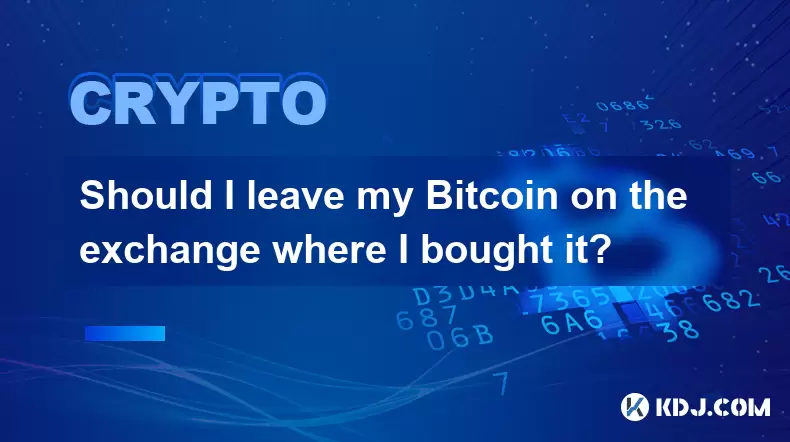
Should I leave my Bitcoin on the exchange where I bought it?
Aug 04,2025 at 06:35am
Understanding the Role of Smart Contracts in Decentralized Finance (DeFi)Smart contracts are self-executing agreements with the terms directly written...
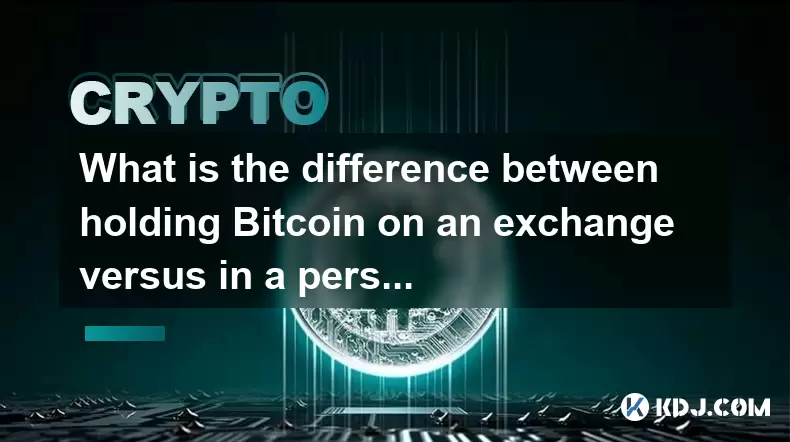
What is the difference between holding Bitcoin on an exchange versus in a personal wallet?
Aug 02,2025 at 03:15pm
Understanding Custodial vs Non-Custodial ControlWhen holding Bitcoin on an exchange, users are essentially entrusting their assets to a third party. E...

What is the environmental impact of Bitcoin mining, and is it a serious concern?
Aug 04,2025 at 02:14am
Understanding the Energy Consumption of Bitcoin MiningBitcoin mining relies on a proof-of-work (PoW) consensus mechanism, which requires miners to sol...

What is a 51% attack, and could it destroy Bitcoin?
Aug 03,2025 at 05:08pm
Understanding the Concept of a 51% AttackA 51% attack refers to a scenario in which a single entity or group gains control of more than half of a bloc...
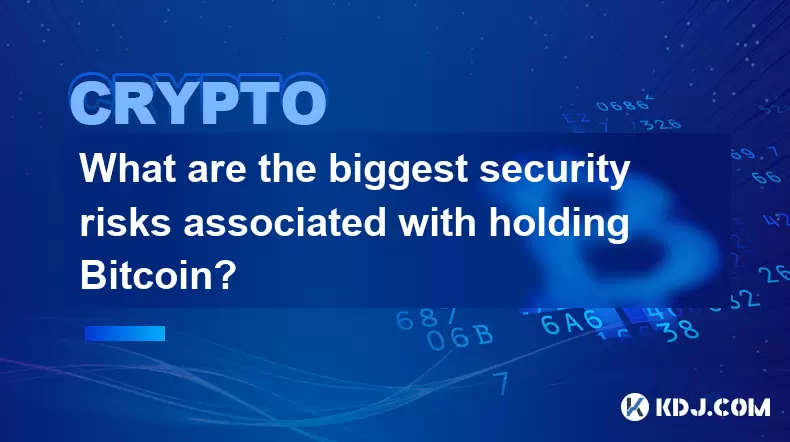
What are the biggest security risks associated with holding Bitcoin?
Aug 03,2025 at 03:16pm
Exposure to Private Key CompromiseOne of the most critical security risks when holding Bitcoin is the compromise of private keys. These cryptographic ...
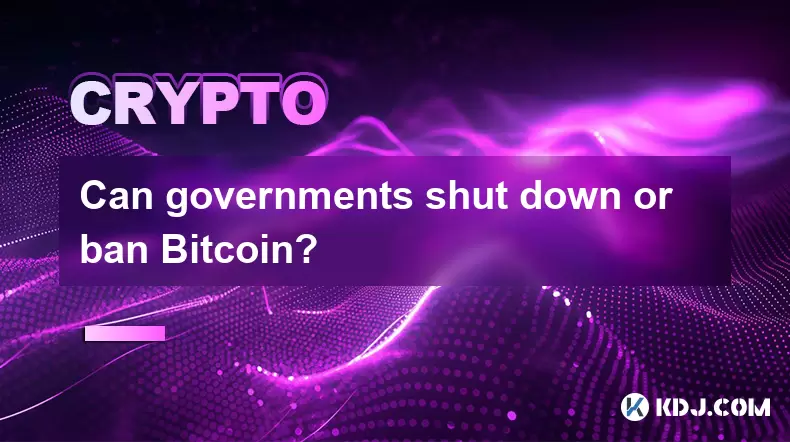
Can governments shut down or ban Bitcoin?
Aug 02,2025 at 09:44am
Understanding Bitcoin’s Decentralized StructureBitcoin operates on a decentralized peer-to-peer network, meaning it is not controlled by any single en...

Should I leave my Bitcoin on the exchange where I bought it?
Aug 04,2025 at 06:35am
Understanding the Role of Smart Contracts in Decentralized Finance (DeFi)Smart contracts are self-executing agreements with the terms directly written...

What is the difference between holding Bitcoin on an exchange versus in a personal wallet?
Aug 02,2025 at 03:15pm
Understanding Custodial vs Non-Custodial ControlWhen holding Bitcoin on an exchange, users are essentially entrusting their assets to a third party. E...

What is the environmental impact of Bitcoin mining, and is it a serious concern?
Aug 04,2025 at 02:14am
Understanding the Energy Consumption of Bitcoin MiningBitcoin mining relies on a proof-of-work (PoW) consensus mechanism, which requires miners to sol...

What is a 51% attack, and could it destroy Bitcoin?
Aug 03,2025 at 05:08pm
Understanding the Concept of a 51% AttackA 51% attack refers to a scenario in which a single entity or group gains control of more than half of a bloc...

What are the biggest security risks associated with holding Bitcoin?
Aug 03,2025 at 03:16pm
Exposure to Private Key CompromiseOne of the most critical security risks when holding Bitcoin is the compromise of private keys. These cryptographic ...

Can governments shut down or ban Bitcoin?
Aug 02,2025 at 09:44am
Understanding Bitcoin’s Decentralized StructureBitcoin operates on a decentralized peer-to-peer network, meaning it is not controlled by any single en...
See all articles

























































































